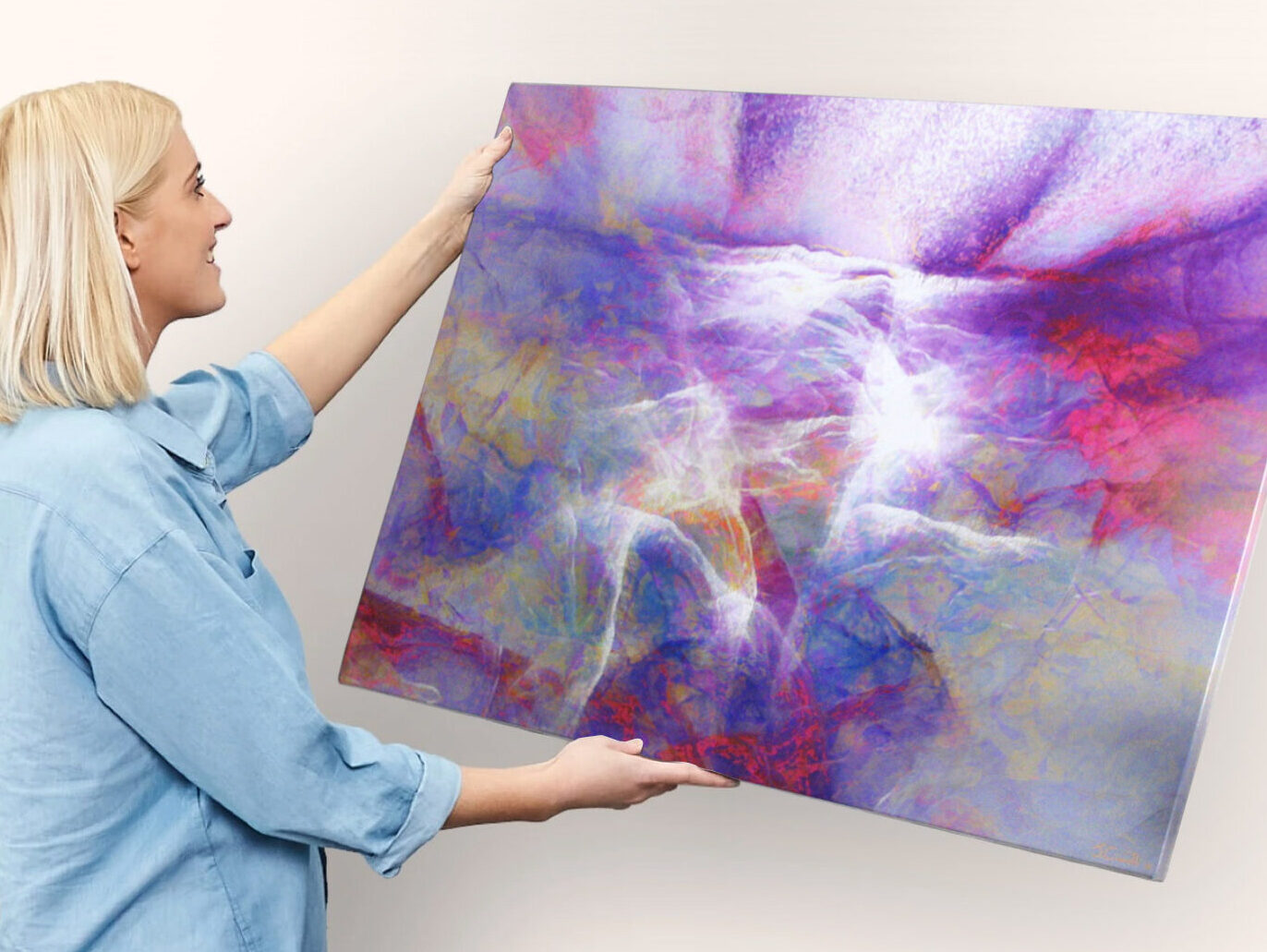Art Buying and Decorating Tips
All art needs to be hung somewhere. Having awareness of the relationship that exists between the art and the space is important. Making the right choices can give greater balance and richness to both. Many pick out art that they love and resonate with first and then decide if it will work in a particular decor setting. If that’s the case you just may need to redecorate the interior slightly to coordinate with the art. When buying a print there are many factors that play into your decision making process so it is beneficial to know as much as you can before buying.
Choosing Printed Mediums
- Metal prints are quickly becoming the new favorite because of superior image clarity, modern look, and low cost shipping rate. They have excellent pop with a luminous quality in the artwork unlike any other medium. The image is directly printed onto 1/16″ thick sheet of aluminum that has been specially treated with a white primer and a high gloss finish. A wooden frame is then adhered to the back so that when you hang the artwork it is offset from the wall and appears to float.
- Canvas prints are one of the most popular choices when reproducing large abstract artwork. Canvas holds up well over time and has a quality feel. The texture of canvas introduces a painterly element but tends to soften the detail somewhat. Canvas prints are finished with either a gloss or matte protective finish. We recommend a gloss finish for more depth and color in the image. Canvas prints can be hung with or without a frame. A canvas print without a frame looks nice gallery wrapped with mirrored artwork on the sides or black sides. The thicker gallery size stretcher bars gives a minimalist contemporary look while offering the appropriate visual size.
- Acrylic prints are glossy and have a glass like feel because the art is printed directly to the back of the 1/4″ material. Like metal, the modern panel seems to float off the wall for a unique contemporary look. Acrylic is very durable and also like metal has a low cost shipping rate. Acrylic prints are also a great choice for a humid environment or an artwork that has water elements.
- A print on fine art paper is a great choice when framing. Picture Rag is hands-down our favorite paper. It produces a gorgeous image with a soft feel and a somewhat luminous quality. It is a very thick heavy weight paper, thicker than canvas. Being acid-free and 100% cotton rag it’s the best choice for archivability. Other great choices are Somerset Velvet, Archival Matte, and Metallic Paper.
Coordination
 Your choice of artwork may change based on the interior space you are working with. You may also consider changing the design elements or color of the space to match the art. Take a look at the main colors in the room and whether or not some of the colors exist within the art. You can also add small accents in the room with the exact same colors found in the artwork to compliment the relationship. A living room that is muted or grey can drastically change with a large colorful print. Then by using something as simple as pillows that match the artwork you end up adding that much needed color coordination.
Your choice of artwork may change based on the interior space you are working with. You may also consider changing the design elements or color of the space to match the art. Take a look at the main colors in the room and whether or not some of the colors exist within the art. You can also add small accents in the room with the exact same colors found in the artwork to compliment the relationship. A living room that is muted or grey can drastically change with a large colorful print. Then by using something as simple as pillows that match the artwork you end up adding that much needed color coordination.
Believe it or not, texture and forms are also important. Some artwork has qualities similar to certain fabrics and materials such as wood, glass, or metal. If does well to try to match some of the qualities. For example, a heavily visually textured artwork works better when objects in the rooms are also heavily textured like a knitted throw blanket. If the artwork has floral objects in it, you may want to consider plant life in the space as well.
Size and Orientation
The great thing about a print is that you can order it in many different sizes based on your need. To better figure out the best size, before buying a print measure the wall and put up masking tape where the corners of the artwork would be. Usually a larger size has greater visual and emotional impact. But choosing a size is also about finding balance with your space and the empty wall. Larger wider pieces do well to compliment furniture or a bed. If there are other pieces of art they are usually hung at the same horizontal viewing line. If the ceiling is high a tall or large portrait piece is appropriate.
Overall Energy and Emotion
Art can express to you energies and feelings that are of many emotions – be it peace, excitement, mystery, sophistication, etc. Art can also introduce elements that reference the earth, water, fire, wind, and metal. Ask yourself what elements are already in the space. You might want to try to find a good balance that you feel comfortable with. Consider what the room is used for and what it needs to compliment it. A boring room might need more energy or vice versa. Studying color theory and feng shui may help you.
Lighting
It helps to hang the artwork in a location with good natural lighting to bring out those colors in the day. If you want to accentuate it at night as a central piece consider overhead lighting or having a tall lamp near the artwork. You will want to be aware that a gloss medium can add glare especially a print on metal or acrylic and you will have to adjust lighting as needed.


